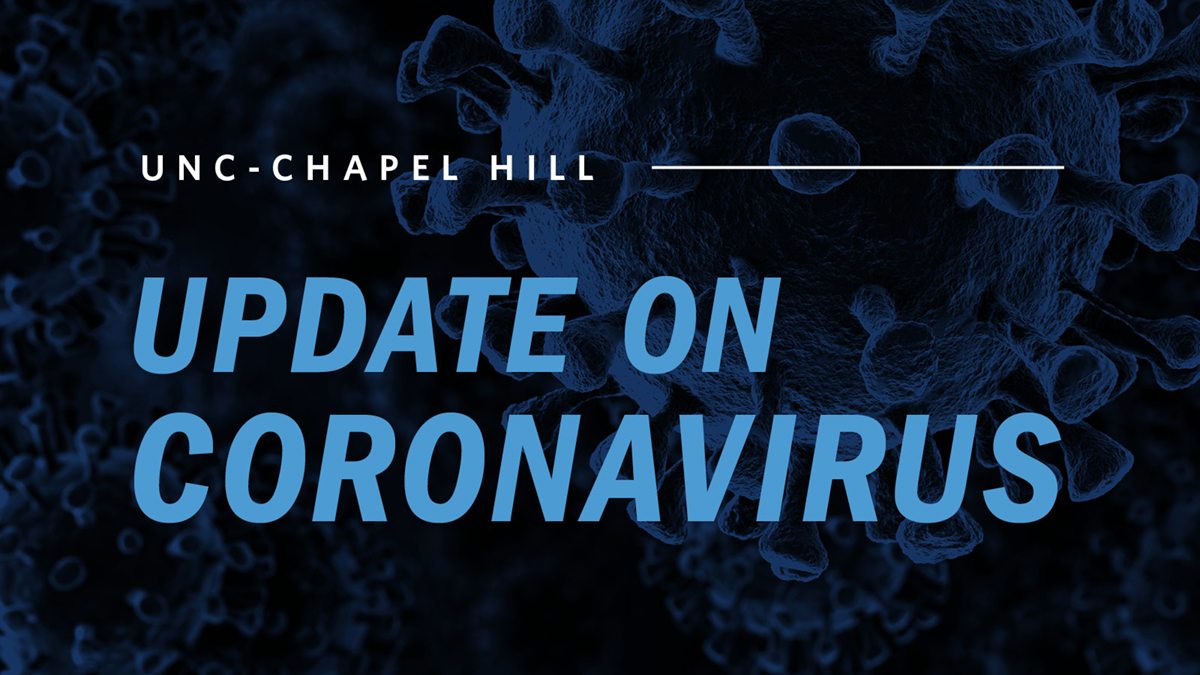Update from campus leaders on coronavirus (March 9, 2020)
The University is implementing new international travel guidelines for students, faculty and staff while also preparing for possible local effects of the coronavirus.

Dear Carolina Community,
Today we are sharing new travel restrictions and guidance, as well as updates on the University’s planning efforts for COVID-19, also known as the coronavirus. This continues to be a rapidly evolving situation; you should anticipate there will be changes to University policy and guidance over the coming weeks as they relate to COVID-19.
It’s important to note that, even if the risks associated with COVID-19 are low for many individuals in our community, it is critical we all do our part to limit transmission and ensure the safety of everyone on our campus and in our communities. Limiting travel is one way the University is actively trying to do that, which is why we are issuing the following updated travel restrictions for students, faculty and staff.
Updated travel guidance
In addition to Level 3 countries due to COVID-19, as defined by the U.S. Centers for Disease Control and Prevention, the University is now prohibiting University-affiliated travel to Level 2 countries due to COVID-19. Anyone returning from Level 2 or Level 3 countries due to COVID-19 is expected to self-quarantine off campus for 14 days.
Planning for local impact
The health, safety and well-being of our community, on and off campus, is our highest priority and responsibility. While there are no confirmed cases on UNC-Chapel Hill’s campus at this time, contingency plans and preparations are well underway.
The University continues to operate at full capacity, though classes are not taking place because of the annual spring break recess. The University continues to work closely with local and state officials and UNC Hospitals to help keep our students, faculty, staff and University community safe.
The University’s Emergency Operations Center has been activated since last week. The Emergency Operations Center is comprised of senior representatives from across the University who work as a team to address campus safety and operations issues related to COVID-19. The Emergency Operations Center is in constant communication with the University senior leadership team, and we are in daily communication with the UNC System and our colleagues from around the state and nation to develop and implement plans to keep our community healthy during the global COVID-19 outbreak.
We are actively tracking updates from the Centers for Disease Control and Prevention, the U.S. State Department and the North Carolina Division of Public Health. We are also developing a series of contingency plans that may apply to several different scenarios if the need arises to protect your safety and that of others on campus, and to ensure essential operations continue, even if work arrangements or staffing levels change.
Preparing for potential working and teaching remotely
In particular, as it relates to instruction, we are developing the capacity to continue course delivery remotely, should that be necessary. Several campus units and academic leaders, together with members of the campus information technology community, have put together a series of resources at keepteaching.unc.edu that should help faculty and instructors prepare. We have an interdisciplinary team working on this and they will continue to develop our remote instruction strategy and update the site as new information and capabilities become available.
We are working with departmental leads and HR staff to review continuity of operations plans and update essential personnel lists. We encourage faculty and staff to work with their departmental and divisional leadership to understand how critical functions would be maintained and who would be responsible in a limited or work-from-home situation. ITS has provided a series of technical support resources to assist with that planning, which are available on the ITS website.
Importantly, we are also working to put together a more solid set of FAQs that address leave and pay requirements should an alternate work schedule be required. These FAQs are driven by the guidance we’ve received from the UNC System, and we’ll continue to update them as we receive new questions and/or new guidance. While we are bound by the rules provided to us by the state and the UNC System, we remain committed to ensuring that any alterations to pay and/or leave resulting from a broader COVID-19 outbreak are limited and we will provide regular information and guidance as it becomes available.
Tips for mitigating disease transmission
The most important action you can take to protect your safety and that of others is to follow CDC guidelines, which include:
- Wash your hands often with soap and water for at least 20 seconds.
- Use an alcohol-based hand sanitizer that contains at least 60% alcohol if soap and water are not available.
- Avoid touching your eyes, nose and mouth with unwashed hands.
- Avoid close contact with people who are sick.
- Cover your cough or sneeze with a tissue, then throw the tissue in the trash.
- Clean and disinfect frequently touched objects and surfaces.
Likewise, if you feel sick at all, whether related to COVID-19 or not, you should stay home. Supervisors are advised to work with staff in managing leave associated with illness. The Office of Human Resources staff are available to assist with questions.
We will stay in regular contact with students, faculty and staff as any guidance and guidelines evolve. The University has also created a webpage dedicated to any University-related updates on the coronavirus.
Anyone with questions about these guidelines can call our hotline at 919-445-5000. The hotline will be staffed Monday through Friday from 10 a.m. to 4 p.m. Messages left after hours will be returned within one working day.
Sincerely,
Kevin M. Guskiewicz
Chancellor
Robert A. Blouin
Executive Vice Chancellor and Provost




